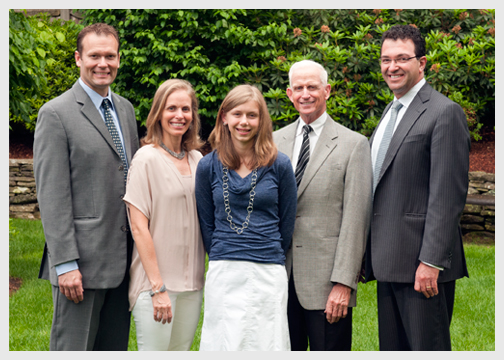Our Funding
The Boston Center for Endometriosis is funded by philanthropy. It is the kindness and generosity of donors who are committed to eradicating endometriosis that motivates our team to work diligently to find a cure.
We would like to extend special gratitude to the J. Willard and Alice S. Marriott Foundation for their inspirational philanthropic support and vision, which led to the development of our new Boston Center for Endometriosis. Through their generosity, and that of many other caring donors, we are able to provide exceptional clinical services, research, and education for adolescent and adult women with endometriosis.
Many thanks to everyone who has contributed to this endeavor.

Pictured: Jess Hatch, Mary Alice Hatch, Emily Hatch, Richard Marriott, Dr. Marc Laufer

Dr. Marc Laufer (left), Director of the Boston Center for Endometriosis, visited with Nancy Marriott (middle left), Richard Marriott (middle right), and Bill Marriott (right) in December 2015.
Latest Updates
August 2017 – Boston Center for Endometriosis founder and Director, Marc R. Laufer, MD, announces the addition of a major donation from The J. Willard and Alice S. Marriott Foundation in support of the Center’s ongoing research program. This three-year award is a continuation of support from the Marriott family.
The gift will be used to support the Center’s major research project: building a one-of-a kind biorepository and database to fuel discovery in endometriosis from adolescence through adulthood. The gift also establishes the Marriott Fund for Clinical Innovation in Endometriosis which will support projects aimed at faster diagnosis and improved treatment for young women. Dr. Laufer describes the Marriott family’s support as “an extraordinary partnership that is advancing the field, helping us find new diagnostics, new treatments and hopefully a cure. With the Marriott support we will intensify our efforts to improve quality of life and preserve future fertility for girls, young women, and adults with endometriosis.” Scientific Director, Stacey Missmer, ScD, added that “being able to continue to connect with girls and women with endometriosis as they experience new successes and challenges is invaluable to determine how to ensure that their dreams can be big and can be achieved.”
The Boston Center for Endometriosis was founded in 2012 through a gift from The J. Willard and Alice S. Marriott Foundation. The Center is committed to providing exceptional care, research, and education.
July 2019 – Researchers from the Boston Center for Endometriosis were recently awarded several research grants funded by the United States Department of Defense’s Congressionally Directed Medical Research Program. The purpose of these awards is to improve health and well-being, to advance knowledge, and to improve clinical care or public health guidelines.
Amy DiVasta, MD, MMSc, Co-Scientific Director for the Boston Center for Endometriosis and Associate Professor at Harvard Medical School, will lead “Novel, Non-Hormonal Therapy for the Treatment of Chronic Pain Due to Endometriosis in Adolescent and Adult Women.” This research study is a clinical trial that will look at a potential non-hormonal therapeutic option for patients with endometriosis who continue to experience pain after surgical treatment.
Holly Harris, ScD, MPH, Epidemiologist in Public Health Sciences at Fred Hutchinson Cancer Center and Assistant Professor at University of Washington, will lead a study with collaborators in the BCE titled, “Inflammation and the Malignant Transformation of Endometriosis.” The goal of this project is to better understand how inflammation may influence cancer driver mutations in endometriosis lesions and explain the very rare relationship between endometriosis and ovarian cancer.
Christine Sieberg, PhD, EdM, MA, Assistant Professor of Psychology at Harvard Medical School and Co-Director of the Biobehavioral Pediatric Pain Lab at Boston Children’s Hospital, will lead “Defining the Role for Descending Pain Modulation and Reward – Aversion Processes Towards the Development of Chronic Pain in Endometriosis.” In this brain imaging study, investigators will explore changes in brain structure and function, and compare differences by age and level of pain after surgery.
Kathryn Terry, ScD, Co-Scientific Director for the Boston Center for Endometriosis and Associate Professor at Harvard Medical School and Harvard T.H. Chan School of Public Health, will lead “Using Affinity-Based Proteomics to Identify Diagnostic and Prognostic Biomarkers for Endometriosis.” The goal of this study is to look for new biomarkers for endometriosis that could be used for screening or assessing potential outcomes after surgery.
Various BCE researchers and collaborators will contribute to these research projects over the next 3-5 years.
